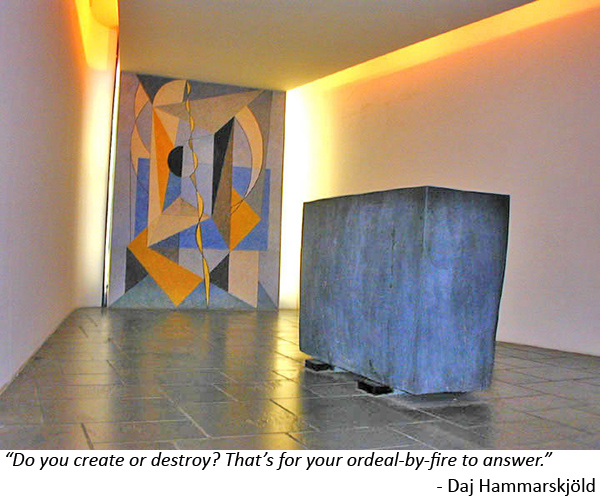Daj Hammarskjöld, the second Secretary-General of the United Nations, thought the UN “should have one room dedicated to silence in the outward sense and stillness in the inner sense.” Because of this he personally planned and supervised the creation of the Meditation Room before he died in a plane crash in 1961 while on a peace mission in the Congo. As you enter this dimly lit, triangular room you face a 9X6.5 foot abstract fresco and a six-and-a-half-ton, four-foot-high, rectangular block of raw iron ore.
The text that Hammarskjöld wrote for visitors includes the following: “The material of the stone leads our thoughts to the necessity for choice between destruction and construction, between war and peace. Of iron man has forged his swords, of iron he has also made ploughshares. Of iron he has constructed tanks, but of iron he has likewise built homes for man. The block of iron ore is part of the wealth we have inherited on this earth of ours. How shall we use it?”
Although the myriad of decisions we make before, during, and after meetings at work and in our communities might not individually set the stage for us to create or destroy, cumulatively they do. Our choices either create or destroy a sense of connection and community; and diminish or develop our ability to talk well together, solve difficult issues, and make wise decisions. Over time, the choices we make about how to interact affect our organizations, communities, and eventually who we are. What impact do you want your choices to ultimately have on our world? What are your intentions when you meet with co-workers or neighbors?
Intentions reflect what is most important to us and help set the stage for what is possible because they shape how we think and behave, which in turn influences the same in others. Because of this, we need to carefully and consciously define our intentions. Ideally, they live at the intersection between what we love and what the world needs, i.e., they reflect an “enlightened self-interest.”
Building on the thoughts of Peter Block in “The Empowered Manager,” our intentions are “enlightened” when they:
- Have meaning, depth, and substance for us;
- Include a desire to contribute something of real value and to be of service to a group interaction;
- Incorporate a commitment to act with integrity (saying what we mean and meaning what we say);
- Have a positive impact on people; and
- Involve understanding as much as we can about the issues at hand (considering information that both confirms and challenges our current thinking).
In other words our intentions benefit us, those around us, and the situation at hand.
My intentions, regardless of whether I am acting as a meeting participant, leader, or facilitator, are to help people (1) feel a sense of safety and belonging so that they can contribute their unique perspectives and experience; and (2) work together collaboratively so they can solve tough issues and create a desirable future. Since we never know which meeting or interaction is going to make an important difference, I assume I might as well behave in all of them as if they were a lynch pin event in the life of an organization or a community.
What are your intentions for one of your meetings this week at work or in your community?


Important
Intentions: so important, and yet we often neglect defining them
Touche. Solid arguments. Keep up the good work.
Dear Mary, again, as so many times before, your gifts of heart, thought and service are catalytic. As I deal metastatic cancer, issues of mortality and how to live life fully, your reminder that intention is central to choice is so valuable. Like most seekers, I have pondered what makes self interest “enlightened”, and have had glimpses of enlightened leadership, expression and action in myself and many others. We binary Westerners tend to seek the light side and shun the dark side – a futile endeavor. Is it not delightfully paradoxical that the experience of enlightenment requires opening up to, exploring and embracing all that is in shadow? That to transcend so often requires going so deep? That enlightened “leadership” requires the heart and mind of the servant? Thank you for your unflagging gifts as you share your unfolding journey.